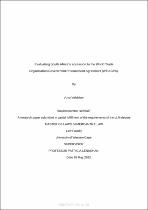| dc.contributor.advisor | Lenaghan, Patricia | |
| dc.contributor.author | Velebhayi, Vuyo | |
| dc.date.accessioned | 2024-01-25T08:11:45Z | |
| dc.date.available | 2024-01-25T08:11:45Z | |
| dc.date.issued | 2024 | |
| dc.identifier.uri | http://hdl.handle.net/11394/10626 | |
| dc.description | Magister Artium - MA | en_US |
| dc.description.abstract | South Africa’s participation in international agreements is governed by s231 of the Constitution of the Republic of South Africa, 1996.1 This section states that the negotiation and signing of all international agreements is the responsibility of the national executive. An international agreement binds the Republic only after it has been approved by resolution in both the National Assembly and the National Council of Provinces, unless it is an agreement referred to in subsection (3) of s231of the Constitution. Any international agreement becomes law in the Republic when it is enacted into law by national legislation; but a self-executing provision of an agreement that has been approved by Parliament is law in the Republic unless it is inconsistent with the Constitution or an Act of Parliament. The Republic is bound by international agreements which were binding on the Republic when this Constitution took effect | en_US |
| dc.language.iso | en | en_US |
| dc.publisher | University of the Western Cape | en_US |
| dc.subject | World Trade Organisation | en_US |
| dc.subject | Government Procurement Agreement | en_US |
| dc.subject | South Africa | en_US |
| dc.subject | Accession | en_US |
| dc.subject | University of the Western Cape | en_US |
| dc.title | Evaluating South Africa’s accession to the World Trade Organisation Government Procurement Agreement (WTO GPA). | en_US |
| dc.rights.holder | University of the Western Cape | en_US |

